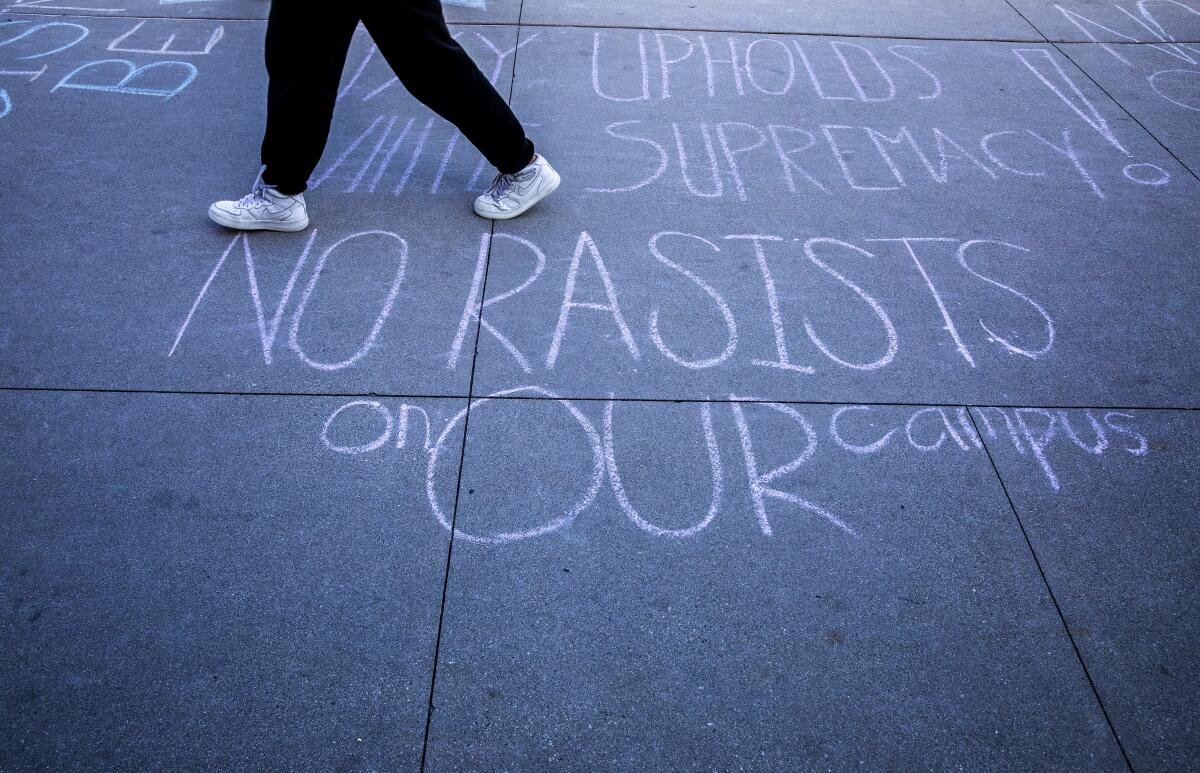Column: Is a racist text from one college student to another hate speech?

Almost every day, the news brings us stories about the racism that plagues this country.
Thursday, a lawsuit was filed against Tesla for horrific acts of alleged racism against Black employees in its Fremont, Calif., plant.
Before that, some Black UCLA gymnasts accused a teammate of using the N-word as she sang a song.
In the past week, I have been following a racial controversy at Occidental College, the small liberal arts school in Eagle Rock where a young Barack Obama once penned some ho-hum poetry.
In December 2020, when Asian Americans around the country were subjected to escalating racist attacks, two white female students had a truly foul late-night text exchange.
The campus newspaper, the Occidental, obtained a screenshot of the conversation:
Student A wrote âall asian people need to die.â
âThatâs awfully racist,â replied Student B, âbut I am interested.â
Wrote Student A: âjust out of all the people on the planet. asian people seem to piss me off the most. and also, they are responsible for the pandemic so they need to die for that too.â
âA pandemic is inevitable and you canât blame an entire race for a Chinese mistake,â replied Student B.
A vile conversation, to be sure.
Against the law? Absolutely not.
Grounds for punishment, or expulsion? Nope.
The second student sat on the texts for nearly a year because, as she told my colleague Jeong Park, she wanted to give her friend a chance to do better.
But when, as she claimed, the friend made other racist comments, she brought the exchange to the attention of the sorority they both belonged to, apparently, with the hope of getting her friend kicked out.
An Asian American member of the sorority leadership, the Occidental reported, was so upset by the texts that she filed a complaint with the school, which is when administrators learned of the texts. She was distressed when administrators told her the private communication did not meet the threshold for moving forward with a discrimination case.
âAt every turn, we were made to feel like we were overreacting to genocidal language, language that also blamed all Asians for the pandemic,â the sorority leader told the college paper. âIt made me feel like the level of disruption to my life these messages caused was simply my own personal failing.â
I can understand being shaken to the core by such hateful language. And I can understand feeling vulnerable, especially at such an intense political and cultural moment, when the previous U.S. president himself was promulgating anti-Asian racism and each day brought fresh news stories about verbal and physical attacks on Asian Americans.
Did the sorority leader overreact? Itâs not as if the offensive words were uttered in public, or sprayed on a building in an act of terrorism. Itâs not as if the author was making a specific threat or had any power to inflict physical harm. Or even that she intended for her words to become known, or actually meant them.
But as anyone who has crossed a therapistâs threshold knows, feelings are neither right nor wrong. They just are.
The sorority leader showed the texts to friends, and the issue blew up after they posted screenshots of the exchange on social media. College administrators strongly condemned the language, but said they were powerless to punish the offending student since private school students have the same free-speech rights as public school students. In any case, the offensive texter has withdrawn from school.
The schoolâs response, widely perceived as legalistic and tepid, provoked an uproar.
Open letters from students, faculty and staff demanded the college do more than simply condemn the hateful speech.
âBy focusing on the legal issues, the administrationâs emails downplayed the profound fears for personal safety and the deep distress that this incident has caused, especially among AAPI faculty, staff, and students who have felt targeted, intimidated and terrorized,â wrote the schoolâs faculty.
Administrators apologized for their tone-deafness and unfurled an ambitious anti-racist initiative, with counseling sessions, rap sessions, anti-bias workshops and a âfacilitated discussionâ about the ramifications of Californiaâs Leonard Law, which extends 1st Amendment protections to students in private colleges.
The college has also created a new position for an education specialist who will develop a diversity and inclusion program for faculty and staff, including administrators, and will incorporate anti-racism education into its new student orientations, starting in August.
Itâs surprising that most of these efforts were not already in place. After all, Occidental, where tuition, books and living expenses come to about $75,000 a year, prides itself on being âone of the most ethnically diverse liberal arts colleges.â Half of students in the class of 2025 are white, 21% are Asian American, 13% are Latino, and 10% are Black.
And what has become of the young woman whose racist texts launched this whole episode? She has not been publicly identified, which is appropriate, given the level of anger she has inspired. Occidental administrators have said she is remorseful, but is no longer enrolled at the school. That, too, is appropriate.
The expectation of privacy is a quaint relic of the pre-text world. Nor do we live in an age where âsticks and stones may break my bones but words can never hurt me.â In real life, words can wound, and wound deeply.
While it took Occidental a minute to recognize this, the school has taken a meaningful first step toward healing those whoâve been hurt.
More to Read
A cure for the common opinion
Get thought-provoking perspectives with our weekly newsletter.
You may occasionally receive promotional content from the Los Angeles Times.











